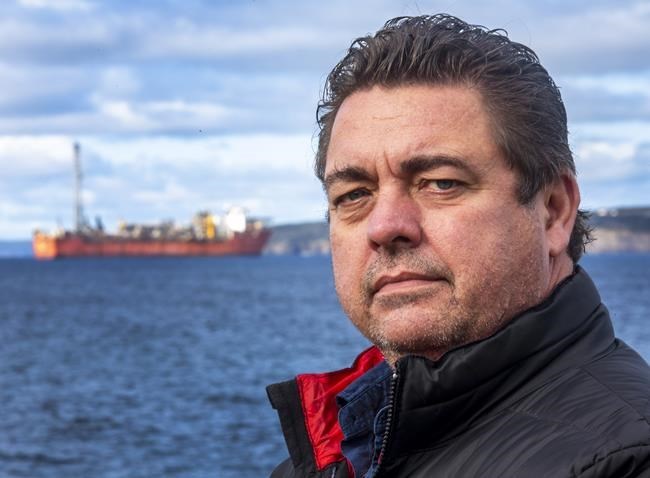ST. JOHN'S, N.L. — The future looks grim for Newfoundland and Labrador's third-largest offshore oilfield, and the head of its workers' union says the ripple effects will be devastating if it shuts down.
Unifor Local 2121 president Dave Mercer said Friday that thousands of people will take a hit if the operators of the Terra Nova offshore oilfield walk away now. Some workers laid off from the idled project months ago have already started to move away, he said.
"They come to me every day," Mercer said in an interview, pausing to swallow back tears. "Every single day. I choke up when I hear it. Because I can't fix it."The people who can fix it, he said, are running the seven oil companies that own and operate the project.
The Terra Nova oilfield sits about 350 kilometres southeast of St. John's. Oil was first discovered there in 1984, and it began flowing in January 2002. The field uses what's called a floating production, storage and offloading vessel, which is essentially a massive ship that can store 960,000 barrels and house 120 workers at a time. The craft is connected to wells in the sea floor by a sprawling network of cables and pipes.
So far, 425 million barrels of oil have been recovered from the field, according to estimates from the Newfoundland and Labrador Oil and Gas Industries Association. About 80 million barrels remain.
The field provides around 1,000 direct jobs and affects thousands more through service and supply sectors like catering, helicopters and environmental monitoring, a news release Thursday from the association said.
But the field hasn't produced oil since November 2019, Mercer said. The vessel needs maintenance in order to keep pumping for another decade, and that work has been held up, most recently because of the crash in oil prices and the COVID-19 pandemic.
"I've had 11 families in the last six months tell me that they're done and they're moving out of the province, and they have," Mercer said. "We have people that work offshore because they have to pay for medical needs for the family members .... Their insurance is cut off. Their benefits are done."
Suncor Energy is the majority partner in the Terra Nova project. Company president Mark Little told The Canadian Press on Wednesday that part of the work needs to be done in Spain, where there's a dry dock facility large enough to accommodate the 300-metre-long vessel.
"Then it has to come back and hit a weather window next year to actually get back on station," Little said. "The problem is we're running out of time to actually do that. We're losing our window."
Suncor wants to proceed, but not all of the partners are on board, he said — even with the Newfoundland and Labrador government offering $175 million in life support earlier this year.
"We continue to be supportive of the asset life extension, and we've advocated for it," Little said during a webcast with investors Wednesday. "But honestly, we've been doing this for many, many months and working it very diligently, and it doesn't look like we're going to get there."
A decision on whether they'll abandon the project and permanently shut down the field will be made on June 15, he said.
Wade Locke, an economist at Memorial University in St. John's, says the Terra Nova troubles are a sign of what's to come. "Both the federal and provincial governments are committed to (fighting) climate change and pretty aggressive targets as well," he said in an interview Friday. "So, you'll see some significant changes by 2030 if they follow through with their aspirations. And by 2050, you'll see a lot of changes."
If the Terra Nova operators are reticent to invest in work to unearth another 80 million barrels of oil, even with a $175 million boost from the government, Locke wonders what that says about some of the less advanced projects on the horizon.
The situation also doesn't bode well for the West White Rose project, which was launched to extend the life of the White Rose offshore oilfield, he said. Suncor owns 26 per cent of that project, and majority owner Cenovus, formerly Husky Energy, announced it was reviewing its operations in the province last September. Cenovus has said abandonment is under consideration.
Mercer is also concerned what a shutdown of Terra Nova could mean for the province's other offshore projects. "If we shut the door and Terra Nova doesn't continue, it's only sending the message to these other oil companies that Newfoundland is not open for business," he said.
In a statement emailed Friday, Energy Minister Andrew Parsons said the province is doing everything it can to keep Terra Nova going. "However, the final investment decision rests with the project partners," Parsons said. "Discussions continue among project owners, and I remain hopeful that partners can reach an agreement to secure the project."
This report by The Canadian Press was first published May 28, 2021.
— With files from Dan Healing in Calgary
The Canadian Press



